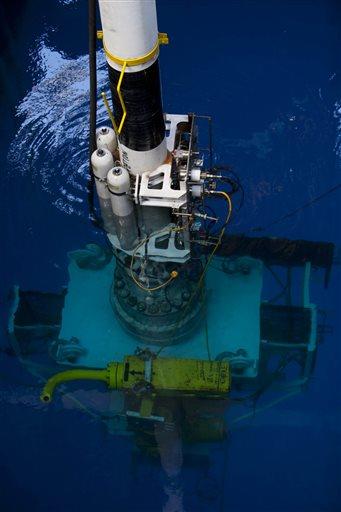 FILE- In this July 11, 2010, file photo, provided by BP, workers onboard the Transocean Discoverer Inspiration deploy the 3 Ram Capping Stack to the Deepwater Horizon BOP in the Gulf of Mexico. Experts for BP and the federal government used the data from the gauges in calculating how much how much oil spilled into the Gulf during the 87 days it took to plug the well. But they will provide a judge with widely different estimates when the second phase of a trial resumes Monday, Oct. 7, 2013, for litigation spawned by the spill. (AP Photo/BP, Marc Morrison, File)
FILE- In this July 11, 2010, file photo, provided by BP, workers onboard the Transocean Discoverer Inspiration deploy the 3 Ram Capping Stack to the Deepwater Horizon BOP in the Gulf of Mexico. Experts for BP and the federal government used the data from the gauges in calculating how much how much oil spilled into the Gulf during the 87 days it took to plug the well. But they will provide a judge with widely different estimates when the second phase of a trial resumes Monday, Oct. 7, 2013, for litigation spawned by the spill. (AP Photo/BP, Marc Morrison, File)
ap.org - abcnews.com - by Michael Kunzelman
September 30, 2013
The focus of a trial over BP's massive 2010 oil spill has shifted from the causes of the deadly disaster to the company's struggle to plug its blown-out well while millions of gallons of crude gushed into the Gulf of Mexico for nearly three months.
The trial's second phase opened Monday with claims that BP could have capped the well much sooner if it hadn't ignored decades of warnings about the risks of a deep-water blowout or withheld crucial information about the size of the spill from federal officials.
Recent Comments